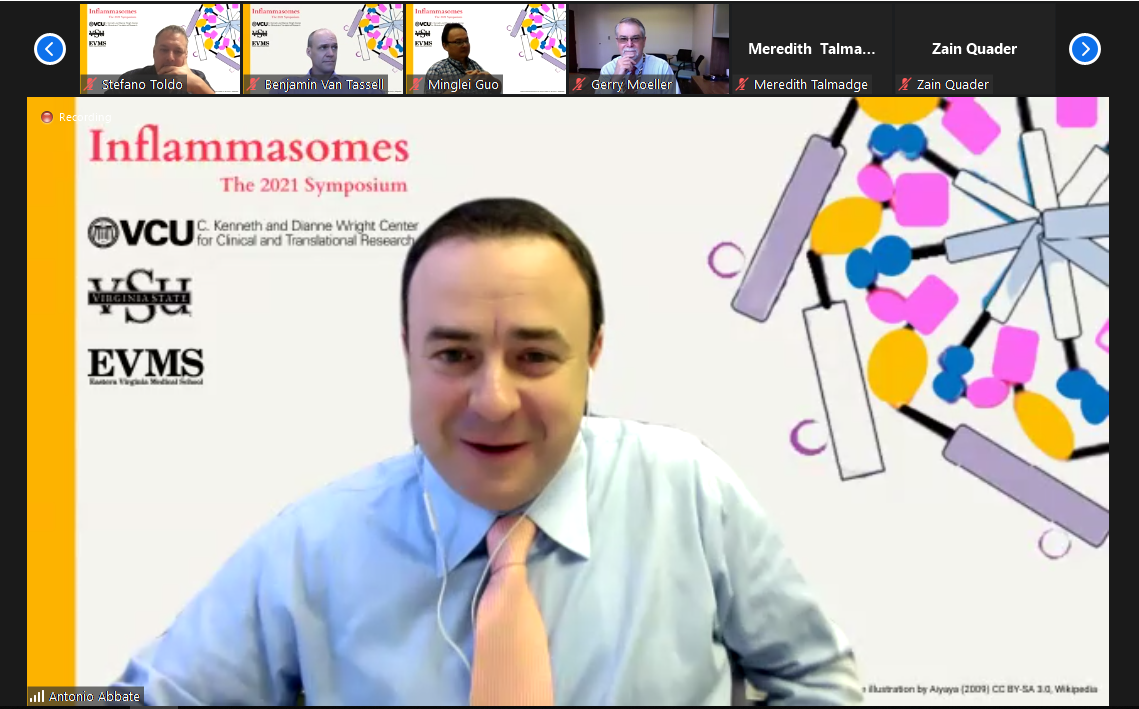Wright Center, VSU, EVMS host first, regional clinical research symposium

Inflammasomes were discovered in 2002, and almost 20 years later, the number of diseases for which the molecule has treatment implications continues to expand.
“It’s amazing how the implications are growing to so many different diseases, whether it’s gout, heart disease, cancer or addiction,” said P. Srirama Rao, Ph.D., VCU’s vice president for research and innovation. “Even more recently, in the context of COVID-19, we’re hearing about inflammatory responses that often leave patients in intensive care units.”
The harmful effects of the molecule’s inflammatory cascades — and how to stop them — were the topic of an inaugural research symposium on Friday, where Rao kicked things off. It was the first of a quarterly event featuring talks on a clinical research topic and co-hosted by the VCU Wright Center for Clinical and Translational Research, Virginia State University and Eastern Virginia Medical School.
More than 90 people joined the symposium to present on and discuss the inflammasome’s macromolecular structure, which is central to the body’s inflammatory response. Presenters spoke to research on how the inflammasome contributes to the progression of disease and how the function of the inflammasome can be inhibited to reduce disease severity and promote health.

The symposium was coordinated by Lauren Harris, M.Ed., M.S., hub research capacity administrator for the Wright Center, and the discussion was led by Antonio Abbate, M.D., Ph.D., associate director of the Wright Center and VCU professor of medicine.
Abbate was joined by moderators Omar Faison, Ph.D., professor of biology and associate vice provost for research and economic development at Virginia State University, and John Semmes, Ph.D., associate dean for translational research at Eastern Virginia Medical School and director of the Leroy T. Canoles Jr. Cancer Research Center.
“It’s been a passion for me to work on bench to bedside projects, and the inflammasome really provides this opportunity,” said Abbate.
Four researchers presented on their work:
- Shijun Zhang, Ph.D., professor of medicinal chemistry in the VCU School of Pharmacy Department of Medicinal Chemistry, presented his research on “Drug discovery targeting inflammasomes.”
- Ming-Lei Guo, Ph.D., assistant professor of pathology and anatomy at Eastern Virginia Medical School, spoke on the topic of “NLRP3 inflammasome and drug addiction.”
- Stefano Toldo, Ph.D., associate professor of medicine and of physiology and biophysics at the VCU School of Medicine, spoke to his work on “Preclinical testing of inflammasome inhibitors.”
- Benjamin Van Tassell, Pharm.D., professor in the VCU School of Pharmacy Department of Pharmacotherapy and Outcomes Science, spoke on “Clinical trials with inflammasome inhibitors.“
Robust discussions followed each researcher presentation, and the attendees engaged in networking about treatment implications, drug development, shared resources, funding opportunities and more.
“Interdisciplinary collaborations are vital to solving society’s most complex and challenging issues,” Rao said. “And in that context this regional symposium on inflammasomes is a perfect example of this collaborative effort.”
Symposium leaders hope that more Virginia institutions will partner on future events to broaden the reach of the research collaborative.
“This concept of reaching out across Virginia and seeing ourselves as a regional research group instead of separate institutions is something I’m very passionate about,” Semmes said.
“I’m excited about what this event means for our continued action in the scientific space,” said Faison. “The symposium brings opportunities for our faculty, for student development, for the future of biomedical science and for equitable health care in the commonwealth.”
A video recording of the symposium will be available in Kaltura in the coming weeks. Subscribe to the Wright Center’s newsletter for notice of upcoming symposiums and the video release.
